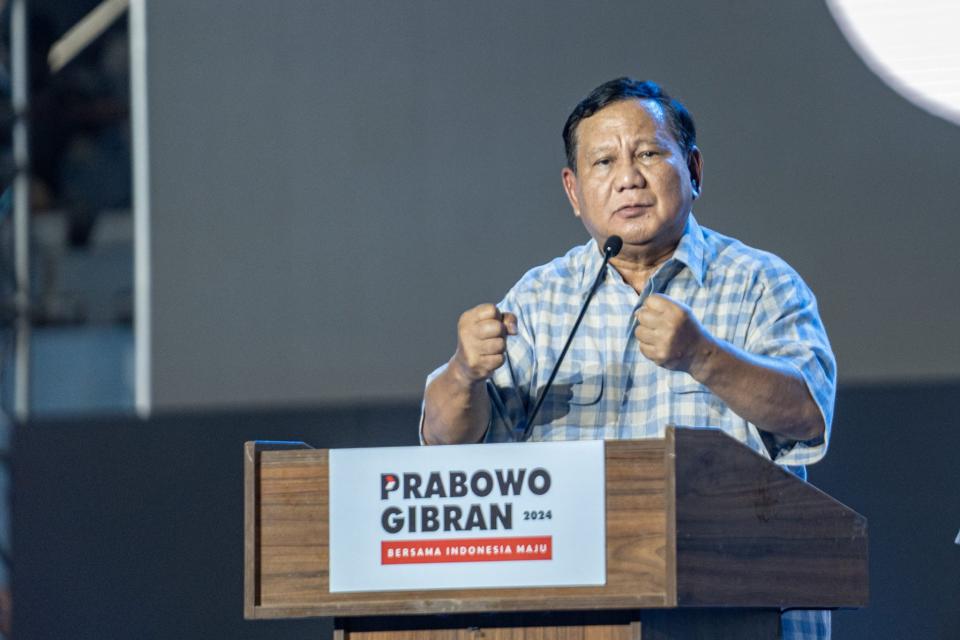Controversial ex-general Prabowo Subianto is likely Indonesia’s next president. Here’s what that means for Southeast Asia’s largest democracy

Indonesian defence minister Prabowo Subianto is declaring an early victory in his third attempt to become the country's president. Prabowo was the frontrunner in the elections, held on Wednesday, promising to continue the policies of his popular predecessor, Joko Widodo, popularly known as Jokowi.
According to several private "quick counts" by independent pollsters based on a sampling of polling stations, Prabowo, 72, has close to 60% of the vote, which would be enough to avoid a run-off. Polls have reported over 90% of the vote by 1:30pm local time. The other two candidates, Jakarta Governor Anies Baswedan and former Central Java Governor Ganjar Pranowo, have yet to concede.
Over 200 million people were eligible to vote on Wednesday, in the world's biggest single-day election. Indonesians were also voting for local and national legislators.
Markets appear to have welcomed Prabowo's early declaration of victory. The Jakarta Composite Index, which tracks the stocks traded on the Indonesia Stock Exchange, jumped by as much as 2.2% in early trading, the largest increase since May 2022, according to Bloomberg. (The index pared back those early gains on Thursday, with it now up about 1.6% from the previous day's close)
A decisive one-round win for Prabowo will be good for markets, Maybank said in a Thursday note, as it will lower "the incentives for opponents to pursue serious election lawsuits" and thus create uncertainty. Maybank analysts also suggested that markets were expecting a clear Prabowo victory, pointing to a recent rally in banking stocks like Bank Mandiri, Bank Rakyat Indonesia, Bank Negara Indonesia, and Bank Central Asia.
"Prabowo campaigned on a continuity ticket—pledging to continue President Jokowi's signature policies,” Brian Lee, an economist at Maybank Securities, wrote. “We expect policies such as resource downstreaming, infrastructure development and capital relocation (Nusantara) to continue.”
In 2019, Jokowi announced an ambitious plan to move Indonesia's capital from Jakarta on the island of Java to "Nusantara," a still-to-be-constructed capital on the island of Borneo. The administration argued the move was necessary as Jakarta suffers from congestion and flooding. The current capital is also sinking due to the over-extraction of groundwater.
The government hopes to move up to 1.9 million people to Nusantara by 2045, with civil servants possibly moving as early as this year. (Over 10 million people live in Jakarta). Indonesia hopes to inaugurate the city this August, but Bloomberg reports that the project faces funding constraints as Indonesia tries to court international investors to cover 80% of its $34 billon cost.
Jokowi also tried to leverage the country's natural resources. Indonesia is home to one of the world’s largest known reserves of nickel, an important component in the making of EV batteries or stainless steel. The Jokowi administration banned nickel ore exports in January 2020 to encourage investment in its domestic metalworking industry. Jokowi has also courted EV companies like Tesla to establish manufacturing facilities in the country, with mixed success.
Prabowo is promising continuity with Jokowi in another way: Prabowo's running mate, Gibran Rakabuming Raka, is Jokowi's son.
Lee warns that Prabowo could be less conservative with spending. The presidential candidate has proposed costly initiatives like a free lunch program for school children, which may cost around 400 trillion Indonesian rupiah ($25.6 billion), or about 2% of the country's current GDP.
Prabowo may target Indonesia's energy subsidies to free up revenue for his programs, Eddy Soeparno, vice-chairman of Prabowo's campaign team, said in a Bloomberg TV interview Thursday. Indonesia spends 350 trillion Indonesian rupiah ($22 billion) on subsidies for diesel and cooking oil. Fuel prices were the subject of mass student protests in 2022.
Who is Prabowo Subianto?
Prabowo ran for president first in 2014, and again in 2019, losing to Joko. He publicly challenged the results on both occasions, yet Joko appointed him to be defence minister in 2019. “I believe I don’t have to tell him about his job─he knows more than I do," Jokowi said at the time.
But Prabowo has a controversial past. While the candidate styled himself as an affable grandfatherly figure to younger voters, he also has a connection to Indonesia's late dictator Suharto, who resigned in 1998 in response to social unrest following the 1997 Asian Financial Crisis.
Prabowo also served as a special forces commander under Suharto, and has been linked to atrocities in East Timor and the 1998 kidnapping of 20 democracy activists. Prabowo denies wrongdoing in both cases. The U.S. barred Prabowo from entering the country due to his human rights record until 2020, when the Pentagon invited him in his capacity as Indonesia's defence minister. Prabowo was also once married to Suharto's daughter, though the two separated following the dictator's downfall in 1998.
The candidate's choice of running mate is also controversial. Gibran, 36, is President Jokowi's eldest son and serves as the mayor of Surakarta. Normally, a candidate for president or vice-president in Indonesia must be older than 40. But an Indonesian court ruled in October that candidates younger than 40—like Gibran—can run for higher office if they previously held elected regional offices. The ruling was issued by Jokowi's brother-in-law.
This story was originally featured on Fortune.com

 Yahoo Finance
Yahoo Finance 